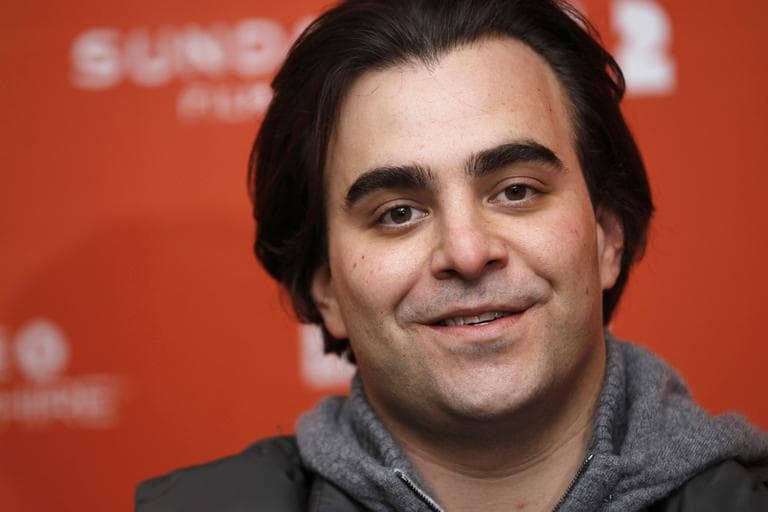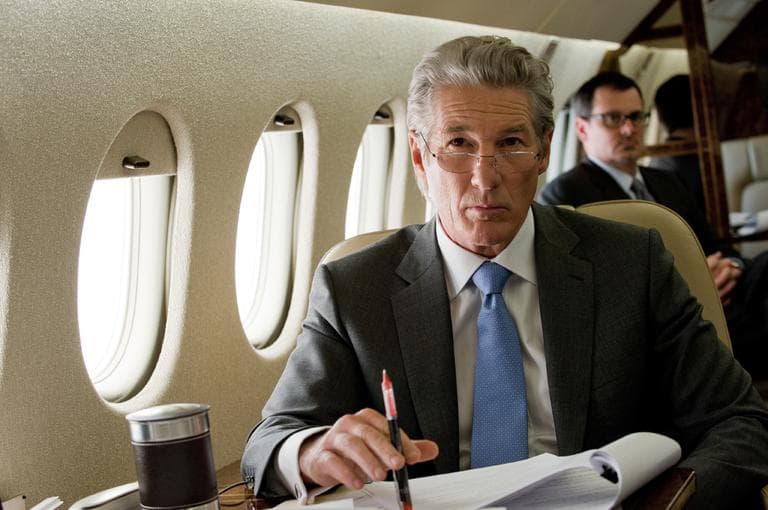Advertisement
Director Nicholas Jarecki Mines Financial Roots For 'Arbitrage'
Resume
As the son of two commodities traders, Nicholas Jarecki gained a lot of knowledge of the financial world.
"I have early memories of being five years old and going down to visit my mother...and having her try to explain what swaps were to me, and then walking 'cross the courtyard to my dad's office where he'd be saying, 'No, no, your mother has it all wrong!" Jarecki told Here and Now's Sacha Pfeiffer. He puts that knowledge to use in writing and directing the new film "Arbitrage," which stars Richard Gere as a morally questionable billionaire hedge fund manager. Sacha spoke with Jarecki in a conversation that's excerpted below.
How do you think growing up with parents who worked in the financial industry influenced your making of this movie?
It definitely gave me a lot of knowledge about the world and exposure to both the players in it and some of the feelings that surrounded it. My personal fortunes rose and fell a little bit with the market. I remember my mom got into some bad trouble in 1987 when that crash had occurred. The first of three bubbles I lived through in my life. So, I know it well.

In the movie, Richard Gere plays Robert Miller, who perpetuates financial fraud in the midst of a big deal. Gere has compared his character to former president Bill Clinton in that both are charming and they sometimes use that charm to manipulate others.
When I had originally conceived the character, I saw him as sort of a quantitative genius – a black box math guy who would build a better mouse trap and in that way he would attract customers. But as Richard inhabited the role, what he brought was the charm and the smoothness and the fact that, in this world, I think we do business with people based on a personal relationship and Richard understood that.
You also portray a very mesmerizing world of the super-rich. There’s a point in the movie where the Richard Gere character asks what an Applebee’s is because he's never been to a chain restaurant like that. How else do we get a glimpse into the lives of the super-rich?
I thought one of the things that was very important was the aesthetic beauty of the film and I’m extremely proud of our achievements in that regard. We made the film with a very low budget on the streets of New York in 31 days. But, I feel that we were able to capture the grand feeling, we wanted that scope, the scale to show his world so it would be all that more meaningful when it came crashing down. We used a lot of what we call the New York golden light. We used some beautiful costumes, we had a lot of help from [the Italian fashion house] Brioni, who gave us all of Richard’s suits for the films at no charge.
What unique qualities do you think Richard Gere brings to this role?
What he brought to the role was absolute dedication and it was a remarkable thing to see. We had a wonderful first meeting. Richard owns a restaurant, it’s his second occupation, and so there we were in the restaurant... we had a three-hour meeting and at the end he said, “Well, do you have anything you would like to work on?” And I said, “Well, these scenes with the girlfriend. I think they…” And he said, “Yeah, I was thinking about that. Maybe I could be a little more aggressive, like, come here. Stand up.” And so we both stood up, we both had our scripts; we start acting out the scene in the restaurant. All of a sudden he throws me up against the wall, [and we're shouting, acting out the couple's argument].
[Then] I’m up against the wall and he’s staring deeply into my eyes with, like, the Richard Gere seductive look that only he can give and I stared back and I said, “I would kiss you right now.” And then we stared for about another five seconds and then we both laughed and he said, “Okay, you’re as crazy as I am. Let’s take a chance on this.”
There’s a lot of shifting morality in this movie. There are many cases where characters make wrong decisions for the (sort of) right reasons. And that leaves you thinking later about how gray right and wrong can be.
I’ve always loved the films that deal with the moral questions we all face. It pretty much all goes back to Aristotle. He said to take a hero and make them great... and then you have them make a tragic error which leads to a tragic downfall. I try to do that with all of the people here. Just as you said, making the wrong decisions for the right reasons. Maybe their heart’s in the right place but they’re conflicted. It feels modern as well as classic and it feels like something we’re all facing today.
I don’t think we really understand how wealth and money should work in our society currently. I think we’re holding onto an antiquated idea and that there’s got to be a little bit more of an evening. Right now it’s all concentrated in the hands of the few who don’t want to give it up and that’s always been the way in history. But I think we’ve been evolving to somewhere else so, these characters facing these moral decisions, it’s hard to give up the things that you love, your power, but there is hope.
Guest:
- Nicholas Jarecki, "Arbitrage" writer/director
This segment aired on September 12, 2012.